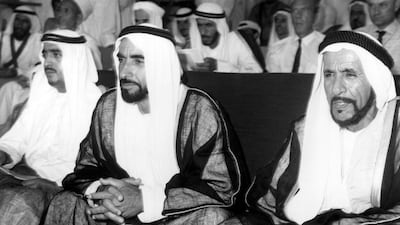Even before the formation of the UAE in 1971, Sheikh Zayed had been hard at work preserving and celebrating his people's cultural heritage. On April 2, 1969, and two years before the formation of the United Arab Emirates, Sheikh Zayed, as the Ruler of Abu Dhabi, issued a decree that would set up the Department of Antiquities and Tourism. Its first task was to establish Al Ain Museum, a building that would house archaeological discoveries unearthed by excavations that began with Sheikh Zayed's support in the 1950s.
Today, Al Ain Museum is recognised as the oldest museum in the UAE and charts the history of Al Ain from the Stone Age through to the foundation of the UAE.
Celebrating the country's past, and preserving it for future generations, is something that was always close to Sheikh Zayed's heart, Mohammed Al Neyadi, the department's director in Al Ain, had once said.
These are the sentiments he is known for. The UAE's first President and Founding Father, Sheikh Zayed bin Sultan Al Nahyan worked tirelessly for his young newly founded country and placed great value in preserving its culture and heritage, and in its citizens' pursuit of knowledge – in reading, culture, the arts, agriculture, education, innovation, science, equine interests, humanitarian activities – and the like. For, as he put it, "A country is truly measured by its heritage and culture."

This Ramadan, an exhibition honouring Sheikh Zayed and offering a glimpse into the many ways he supported art, celebrated culture and advocated for education will be staged in The Galleria Mall on Abu Dhabi’s Al Maryah Island.
Organised as part of the dozens of initiatives, activities, awards and events being held across the UAE this year to mark the Year of Zayed – for 2018 marks 100 years since his birth of the UAE's late Founding Father – and on May 6, he would have been 100 years old. The exhibition will feature 40 photographs donated by on loan from The National Archives. The chosen photographs showcase the historical significance of Sheikh Zayed's rule and the impact of his legacy on within the UAE.
_______________
Read more:
Sheikh Zayed's 100th birthday is a moment to reflect on extraordinary growth
President orders payment of one month salary to all Government employees
Year of Zayed: remembering the vision of an innovative and inspirational leader
_______________
In several photographs, he is seen visiting schools across the UAE, whether to meet young students in Ras Al Khaimah, congratulate teachers in the capital or to support women seeking higher education in Al Ain. There’s a photo of him at the opening of the UAE University in 1977, visiting a literacy class, handing out graduate awards in secondary schools and speaking to students in Ghayathi.
He once said: “The best investment of our wealth is in creating cultured and educated citizens,” and also, “Science and culture are the cornerstone of civilisation, progress and nation-building”. He lived these sentiments completely.
Born 100 years ago in 1918 to the Bani Yas tribe in Al Ain, Sheikh Zayed became the Ruler's Representative in Al Ain in 1946, then the Ruler of Abu Dhabi in 1966.
In 1971, on December 2, he was instrumental in forging the union and was elected the President of the UAE, a role he maintained for 33 years until his death in 2004.

His legacy is one that is tangible today. Under his rule, the UAE was transformed from a desert into a thriving modern state. He commissioned the building of the Sheikh Zayed Grand Mosque, a project which started in 1996 and was completed after his death in 2007, and which he wanted to build in order to create a structure that would unite the cultural diversity of the Islamic world with the historical and modern values of architecture and art. Today, it is considered one of the most beautiful structures in the world, drawing millions of visitors annually, and housing a community library stocked with classic books and publications addressing a range of Islamic subjects: sciences, civilisation, calligraphy, the arts and coins, including some rare publications dating back more than 200 years.
_______________
Follow our #Zayed365 special coverage
_______________
But his vision for development went far beyond infrastructure, architecture and landscaping. Always, he emphasised the importance of building human capital, and the photos of the exhibition will showcase how frequently he used to meet with citizens, who he described as "the true resource on this land". He gained a reputation for being one of the most approachable leaders of his day, and often said that "there should be absolutely no barriers between the Rulers and the ruled".
In the exhibition, there are photos of Sheikh Zayed atop his horse, and one of him reclining among his people with a falcon perched on his arm. He was known for encouraging and celebrating equestrianism, camel racing and hunting as examples of cultural heritage and national identity.
In one particular photo, taken on April 11, 1995 in Al Mushrif Palace and included as part of the Ramadan exhibition, the late Sheikh Zayed is seen shaking hands with the late Nelson Mandela. Mandela had been president of the Republic of South Africa for four years at the time, and Sheikh Zayed honoured him with the Zayed Medal First Class on the occasion of the South African's first, historic state visit to Abu Dhabi.

To mark the start of the Year of Zayed, Sheikh Mohammed bin Zayed, Crown Prince of Abu Dhabi and Deputy Supreme Commander of the Armed Forces, said: "The best way to celebrate the Year of Zayed would be by spreading Zayed's glorious human and cultural legacy via all the people of the UAE, to continue his inspirational and noble values, and introduce these ideals to new generations."
That is exactly what the exhibition will celebrate.
The Year of Zayed exhibition is part of The Galleria’s upcoming Ramadan events. Entry is free and the exhibition will be set up in the mall’s public space.

